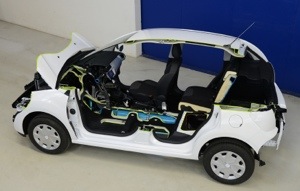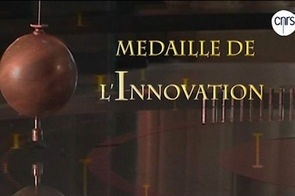Archive
Time for innovation to make sense and for humanity to step on the path to progress once more
 On Monday evening I listened to Etienne Klein’s thought-provoking talk at Les [im]pertinents in Paris: “is there a future for the idea of progress?” A physicist and philosopher of science, Klein is a strong advocate of the role of science as an engine of innovation but observes that in our so-called post-modern society the link between science/innovation on the one hand and human progress on the other hand appears to be increasingly tenuous, if not severed, in the minds of people. How did it come to this and how can we retake our future in our own hands? Read more…
On Monday evening I listened to Etienne Klein’s thought-provoking talk at Les [im]pertinents in Paris: “is there a future for the idea of progress?” A physicist and philosopher of science, Klein is a strong advocate of the role of science as an engine of innovation but observes that in our so-called post-modern society the link between science/innovation on the one hand and human progress on the other hand appears to be increasingly tenuous, if not severed, in the minds of people. How did it come to this and how can we retake our future in our own hands? Read more…
City Cableways – A low-cost infrastructure solution for the post-crisis rebound
 Cableways evoke primarily memories of mountain resorts and viewpoints. Aiguille du Midi in France, Rote Nasse in Switzerland, Plateau Rosa in Italy fly over stunning Alpine sceneries. Masada cableway in Israel, Table Mountain aerial cableway in South Africa, or Rio cable car in Brazil reach the top of mountains or plateaus otherwise difficult to access and no less stunning. Naturally, when we think cable car, we think going up, usually in a site of natural beauty.
Cableways evoke primarily memories of mountain resorts and viewpoints. Aiguille du Midi in France, Rote Nasse in Switzerland, Plateau Rosa in Italy fly over stunning Alpine sceneries. Masada cableway in Israel, Table Mountain aerial cableway in South Africa, or Rio cable car in Brazil reach the top of mountains or plateaus otherwise difficult to access and no less stunning. Naturally, when we think cable car, we think going up, usually in a site of natural beauty.
 Yet, slowly but surely, cableways have been finding their ways in cities, not only cities built at the foot of some sort of mountain such as Cape Town, Rio or Barcelona, but also cities as flat as London, Cologne or New York. In most cases, their purpose is to fly over a natural obstacle such as a river, but increasingly projects are popping up left and right for cableways flying across industrial areas or simply districts too densly populated to contemplate street level infrastructure. The idea may not be entirely new, but judging by the number of projects, it looks like an idea whose time has come. Here are a few reasons why.
Yet, slowly but surely, cableways have been finding their ways in cities, not only cities built at the foot of some sort of mountain such as Cape Town, Rio or Barcelona, but also cities as flat as London, Cologne or New York. In most cases, their purpose is to fly over a natural obstacle such as a river, but increasingly projects are popping up left and right for cableways flying across industrial areas or simply districts too densly populated to contemplate street level infrastructure. The idea may not be entirely new, but judging by the number of projects, it looks like an idea whose time has come. Here are a few reasons why.
PSA’s Hybrid Air – A low cost technology for the post-crisis rebound
 Writing in December about past lessons on innovation for the post-crisis rebound, I relayed Marc Giget’s view that crisis have proven to be a fertile ground for innovation as long as it is frugal. Cost-efficient products, whether in terms of acquisition cost or running costs or both, are the typical winners that lead the way out of the crisis. This lesson casts some doubts on the short term viability of Renault-Nissan’s drive for full electric vehicles, but vindicates the ultra-low-cost strategy that they pursue through their Dacia subsidiary.
Writing in December about past lessons on innovation for the post-crisis rebound, I relayed Marc Giget’s view that crisis have proven to be a fertile ground for innovation as long as it is frugal. Cost-efficient products, whether in terms of acquisition cost or running costs or both, are the typical winners that lead the way out of the crisis. This lesson casts some doubts on the short term viability of Renault-Nissan’s drive for full electric vehicles, but vindicates the ultra-low-cost strategy that they pursue through their Dacia subsidiary.
Yesterday, another great example surfaced: troubled French car manufacturer PSA (owner of Peugeot and Citroen brands) unveiled its Hybrid Air technology, which seems particularly fit for the post-crisis rebound. Read more…
Innovating for the post-crisis rebound
 Schumpeter defines innovation as a process of creative destruction. The point is not merely that innovation can still happen in times of crisis; it is that crisis are the best time for era-defining innovations to emerge. In yesterday’s session of the Mardis de l’Innovation cycle (in French), Marc Giget highlighted a few powerful examples of companies, which emerged or re-emerged stronger out of the Great Depression of the 30s with winning products, such as GE and its refrigerators and washing machines, Converse and its emblematic (and ugly) shoes, or the entire machine-tool sector. As it turned out, the Great Depression became one of the most innovative periods in American history.
Schumpeter defines innovation as a process of creative destruction. The point is not merely that innovation can still happen in times of crisis; it is that crisis are the best time for era-defining innovations to emerge. In yesterday’s session of the Mardis de l’Innovation cycle (in French), Marc Giget highlighted a few powerful examples of companies, which emerged or re-emerged stronger out of the Great Depression of the 30s with winning products, such as GE and its refrigerators and washing machines, Converse and its emblematic (and ugly) shoes, or the entire machine-tool sector. As it turned out, the Great Depression became one of the most innovative periods in American history.
Today, some post-crisis winners are already emerging, though others may still be in the making. Examples include: Read more…
Chinovation: mastering execution
 I’ve been wondering recently about the soul of Chinovation. Last night, I just connected three dots:
I’ve been wondering recently about the soul of Chinovation. Last night, I just connected three dots:
- At his conference on innovation a week ago, Marc Giget reminded us that half of inventions of European Renaissance originated from China. At the time – and until the 18th century – China represented roughly a quarter of the world economy, before crashing down in the 19th century as industrial revolution took off in Europe. Never allowing China to fall behind the rest of the world on technology has been a major driver for the current resurgence of China as an economic and political giant. Read more…
Indovation on a mission; Chinovation still soul-searching
 I like to do some basic research before going to a conference as a participant – even as a speaker 🙂
I like to do some basic research before going to a conference as a participant – even as a speaker 🙂
Prior to attending Marc Giget’s conference in Paris on the emerging Chinese and Indian models of innovation, I started my basic research by googling the words ‘indovation’ and ‘chinovation’ that I had front of mind. While both searches return the usual 10+ pages of links, I was struck by a big difference. Read more…
